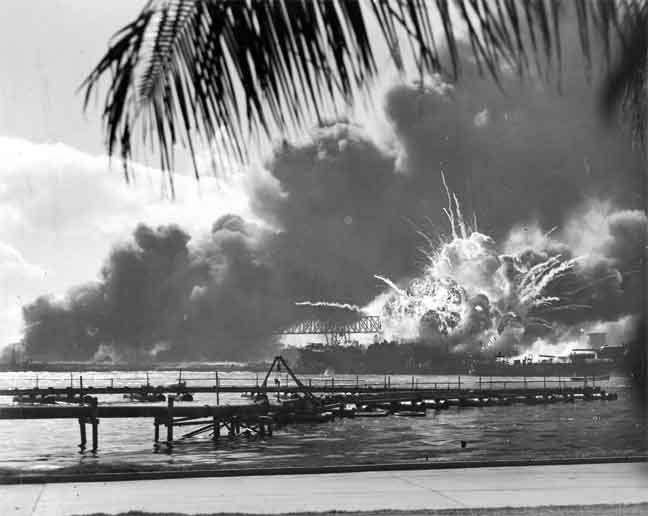Pearl Harbor

Pearl Harbor December 7, 1941
The Japanese and the Americans engaged in extensive negotiations throughout the fall. The Japanese diplomats were given a deadline by their government of the end of November, to achieve an agreement by peaceful means, otherwise war would result. The negotiations got nowhere and on December 7th, the Japanese attacked..Roosevelt's initial reaction to the news of the attack on Pearl Harbor was one of relief; the waiting was finally over. As the day wore on, and the extent of the disaster became clear, Roosevelt and the nation were stunned. The President took immediate action putting the US on a war footing. On December 11, Germany and Italy declared war on the US. Roosevelt involved himself in the overall strategy, but appointed the best men for command and let them implement the strategy without interference. Roosevelt was directly involved in everything relating to war production. On December 22, Winston Churchill arrived in Washington for a summit on war plans. Plans were made for a Europe-first strategy. During the initial period the news from the front was grim. The Japanese advanced across the Pacific and German sub- marines were sinking too many ships right off the American coast.
When Roosevelt awoke on December 7 he was troubled. The night before he had concluded that the Japanese would strike. At 1:50 a.m., he received a call from Secretary of War Knox informing him of the attack on Pearl Harbor. His initial reaction was one of relief- the waiting was over. As the extent of the losses at Pearl Harbor became clear, the relief soon turned to anger. The next morning, Roosevelt went before Congress and asked for a declaration of War against Japan. There was only one dissenter. On December 11, the other foot dropped, when Germany and Italy declared war on the United States. This alleviated the need for Roosevelt to make the first move against Germany; a move that might not have been popular.
Roosevelt had a Christmas guest in the White house, Winston Churchill. Churchill and his staff arrived to coordinate British and US war plans. At the ensuing conference, war plans were solidified that would make defeating Nazi Germany the first objective of the war. During the conference, Churchill first presented his plan for a joint invasion of North Africa. Roosevelt gave his initial backing for the plan, despite the fact that his military advisors preferred placing all the resources behind a direct attack on France.
Reports from the front, however, were far from satisfactory. The Japanese were rapidly advancing across the Pacific. The Japanese rapidly captured Wake Island. They attacked the Philippines, quickly beating American forces. US forces were withdrawn to the Corrigidor Island and from there to Bataan Peninsula where they were forced to withdraw. The only good news on the Pacific front was an attack on Japan by American B-24 bombers launched from carriers.
In the Atlantic the news was no better. German U-boats were sinking American ships in clear view of the coast.
In the meantime, Roosevelt had taken clear control of the war effort. From the moment of the attack, he became the Commander-in-Chief. He was in charge of overall plans and strategy, while leaving to the military the job of implementing them.
 >
>